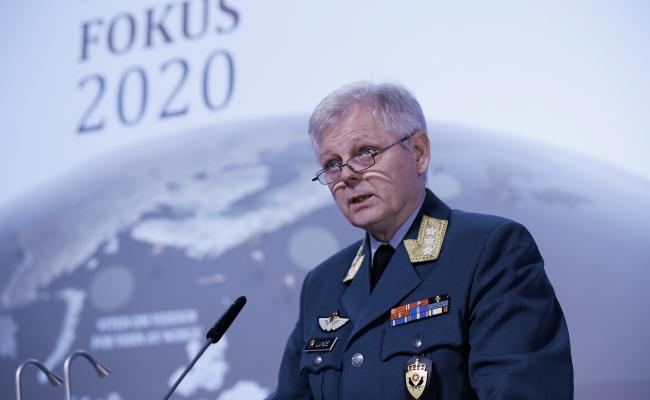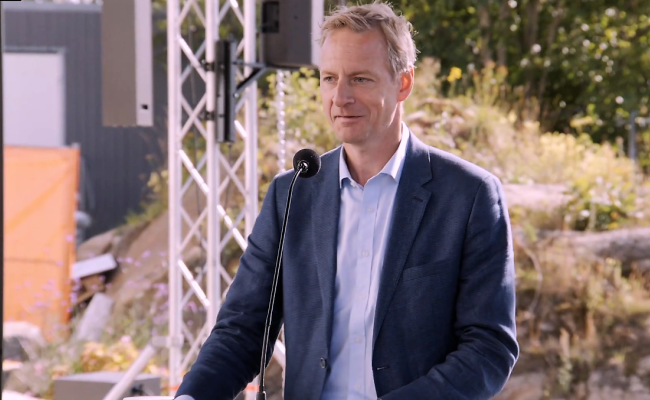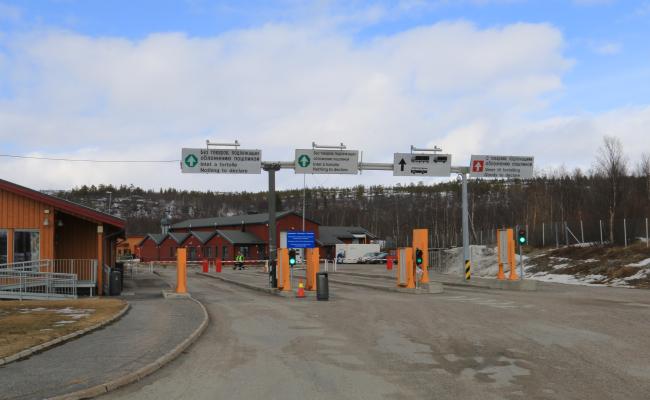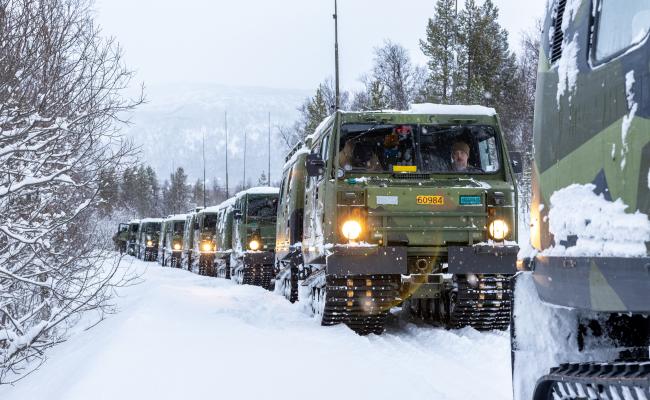Norwegian Intelligence Service: The Past Year’s Development Has Increased Norway's Geopolitical Significance
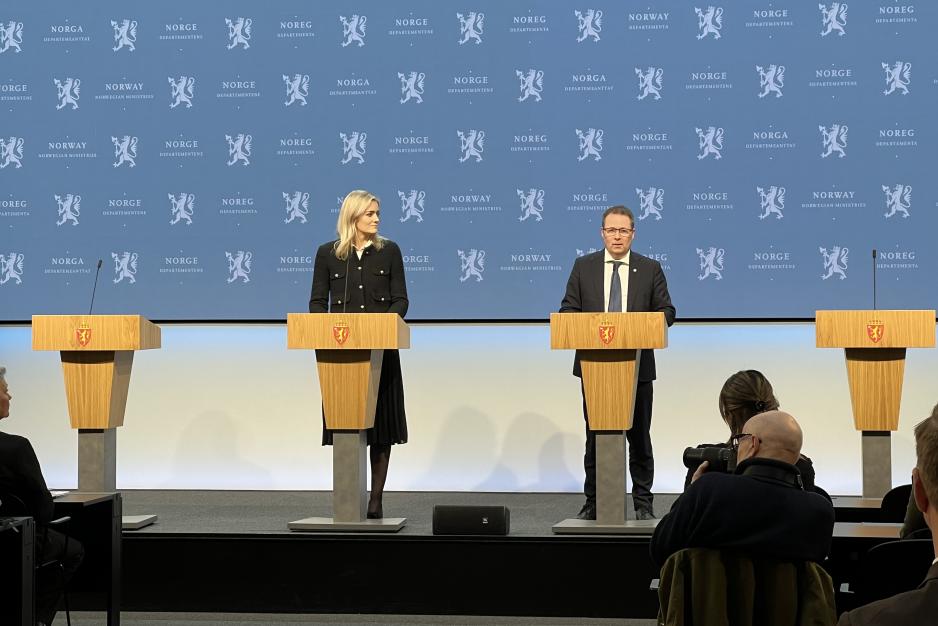
Minister of Justice and Public Security, Emilie Enger Mehl (Center), and Minister of Defense, Bjørn Arild Gram (Center), at a press conference about this year's threat and risk assessment from the Norwegian Intelligence Service, the Norwegian Police Security Service, and the National Security Authority. (Photo: the Norwegian Ministry of Defense)
"The war in Ukraine has increased Russia's need to fortify its security interests in the Arctic. This is due to the recognition that the Arctic can hardly be kept out of the confrontation with the USA and NATO," says Deputy Head of the Norwegian Intelligence Service, Lars Nordrum.
On Monday, The Norwegian Intelligence Service, the Norwegian Police Security Service, and the National Security Authority, presented their threat and risk assessments for 2023.
"There is a great layer of seriousness over what is presented," said Minister of Defense, Bjørn Arild Gram (Center), during the press conference.
Much attention has been devoted to Russia's war of aggression against Ukraine in this year's threat assessments.
"The war has changed a lot regarding the Norwegian and European security situation. Today, Russia constitutes the biggest threat against Norwegian and European security," said Gram.
Both he and the Deputy Head of the Norwegian Intelligence Service, Lars Nordrum, emphasized that Norway's strategic position is becoming more important, both for Russia and NATO allies.
Unpredictable
"It is in Norway's interest that allies show the will and ability to contribute to security in our immediate areas. At the same time, we must account for Russian activity in the High North becoming less predictable," said the Minister of Defense.
Nordrum elaborated on how the war in Ukraine affects Norway and the High North when he presented the main features of the Norwegian Intelligence Service's yearly and open threat assessment Fokus 2023.
"The war in Ukraine has increased Russia's need to fortify its security interests in the Arctic. This is due to the recognition that the Arctic can hardly be kept out of the confrontation with the USA and NATO. With that, the tension in the north may increase," he explained.
The NATO expansion connects Norway more closely to the Baltic Sea region.
Increased geopolitical significance
With NATO expanding to Finland and Sweden, Norway's maritime areas, territories, and infrastructure will have a changed significance for Russia, believes the Intelligence Service.
"The past year's development has increased Norway's geopolitical significance in the eyes of the Russia. That is because of Swedish and Finnish NATO applications, among other things," said Nordrum and points out that the NATO expansion connects Norway more closely to the Baltic Sea region, one of Russia's most important operational theatres.
To the Norwegian broadcaster NRK, Nordrum says that Norway will be central in the resupply of allied reinforcements to Sweden and Finland and that Swedish and Finnish NATO membership thus makes Russia more mindful of Norway. At the same, he specifies that the Russian reactions to Norway have been restrained.
"Of course, there is a lot of distrust between Russia and NATO and that might result in misunderstandings and increased tension in our immediate areas also," says Nordrum to NRK.
The Northern Fleet's activities
In the report, the Intelligence Service writes that NATO operations in the High North will be met with Russian military activity to maintain the Northern Fleet's situational awareness, exercise strategic deterrence and demonstrate credible naval and air defense capabilities.
So far, however, there have been no changes in Russia's response to allied activity in the northern regions, the report says.
The main mission of the Northern Fleet's air forces is only slightly affected by the Ukraine War. The number of aircraft on the Kola Peninsula is largely the same as before, according to the report.
"The air force's training and activities are expected to be carried out almost as normal, with a focus on routine training and air defense operations. Patrols with Russian strategic bombers in Norway's immediate areas will probably occur, but the trend has been downward, as the planes are largely tied up in the Ukraine War. Temporary deployment of strategic bombers in the High North and on Kola, on the other hand, have occurred in 2022, and will continue in 2023," it says.
The Northern Fleet's naval forces will still carry out routine fleet exercises, longer submarine patrols in the Barents Sea, and submarine operations in the Atlantic Sea. The supply of new silent multi-role submarines increases the fleet's capacity in the Norwegian Sea and the Atlantic, the report states.
The Intelligence Service also points out that the land forces at Kola suffered extensive losses of personnel and materiel in Ukraine. The Northern Fleet may also have lost up to a hundred tanks and armored personal carriers. The Northern Fleet has also sent surface vessels to the eastern Mediterranean and landing craft to the Black Sea to support the invasion. Several of the vessels are expected to remain in the operational areas in 2023.
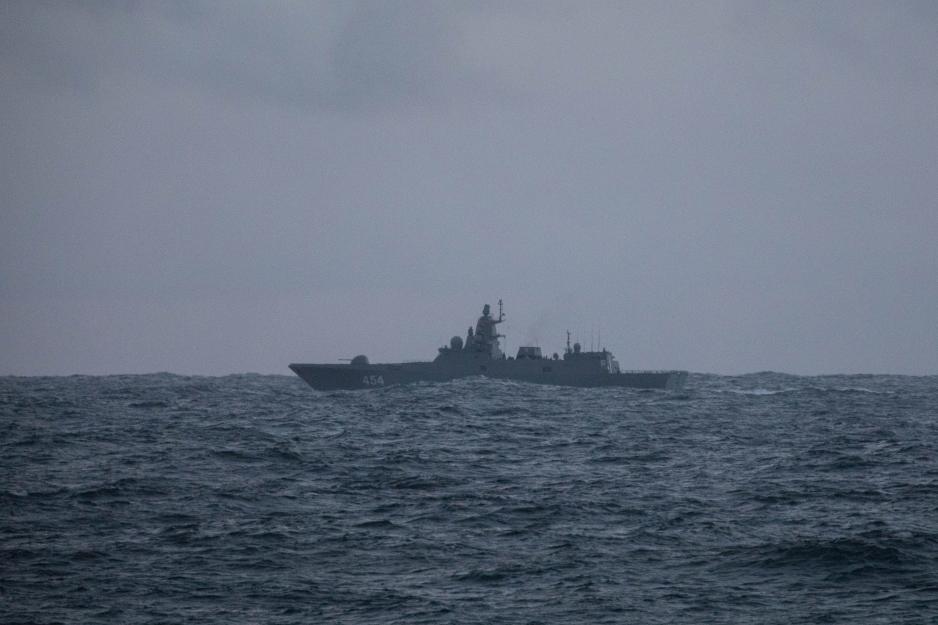
The Norwegian Intelligence Service writes that the Northern Fleet's naval forces are essentially intact. Pictured is the Russian frigate Admiral Gorsjkov which belongs to a new class of frigates that are equipped with very modern missiles. (Photo: the Norwegian Armed Forces)
The ability to understand the Norwegian position
The Intelligence Service believes that Russia will become a more unpredictable neighbor for Norway and that we will see a less predictable Norwegian policy. Norway is to a lesser extent seen as a neighboring country with which Russia has overlapping interests.
Nordrum emphasizes that it will be more difficult to predict Russian decision-making processes that concern Norway and its immediate areas.
"In Moscow, Norway is seen as a part of a Western aggressive collective. And to a lesser extent as a neighbor. Furthermore, Russian diplomatic efforts are scaled down in the West. This may affect how well Russia understands Norway's political position. At the same time, the Russian intelligence threat against Norway will increase, both in the search for insight into Norwegian decision-making processes and in the pursuit of technology," he said.
"Russia must know where they have us. This is an important pillar in Norwegian security policy. At the same time, we are completely dependent on deterrence. It will get better when Finland and Sweden become members of NATO. Then we can practice and train more together and there will be a greater focus on the High North," Norwegian MFA Anniken Huitfeldt (Labor) points out to NRK.
In a recent interview with High North News, Huitfeldt clarifies that it is important to maintain some contact with Russia in order to minimize the risk of misunderstandings and intentional escalation of conflict in the Arctic.
China seeks influence
Deputy Head of the Norwegian Intelligence Service, Nordrum, maintains that Russia and China remain the greatest threats against Norway and Norwegian interests.
He also highlighted the interaction between the two countries and how a Russia that is isolated from the West needs support from states outside of the sanction regime, for development projects in the Arctic and for access to technology, among other things. China will remain the most important partner, he said.
The Intelligence Service also stresses that China will continue to seek influence over institutional and legal frameworks and will continue to direct intelligence and influential activities toward Arctic states.
Excerpt from Fokus 2023 about Russia in the Arctic
- Seeking investment from non-Western countries; Russia signalizes an ambition to intensify the development in the Arctic, but will probably have to cut down the budgets. Moscow specifically seeks non-Western funding for ambitious energy projects. Potential investors will be conscious of Western sanctions. China remains the most important cooperation partner. Russia seeks to limit the Chinese footprint in the Arctic but is dependent on a larger Chinese engagement to achieve its ambitions.
- Defense of the base complex more critical; Both the tension between Russia and the West and high conventional losses in Ukraine increases the importance of Russia's nuclear weapons and the strategic base complex on the Kola Peninsula. The Northern Fleet's main mission, to defend the bases on Kola and carry out deterrence with strategic submarines, will become more important. Since the land forces essentially have been moved from Kola, the mission is now primarily solved with naval and air forces.
- Balance between cooperation and control; Russia has a fundamental interest in not increasing tension in the Arctic. Despite growing distrust of the West, Russia has been interested in promoting the law of the sea and other international frameworks. If Russia were to conclude that cooperation is no longer of Russian interest, Kremlin will seek to increase national control in the region. There are several indications that this is already happening. In December, Russia passed a law to authorize the control of foreign state vessels in the Northern Sea Route. Furthermore, the Arctic is defined as a "vital" area in Russia's new maritime doctrine, which allows for the use of military means to protect Russian interests.
Also read
This article was originally published in Norwegian and has been translated by Birgitte Annie Molid Martinussen.


